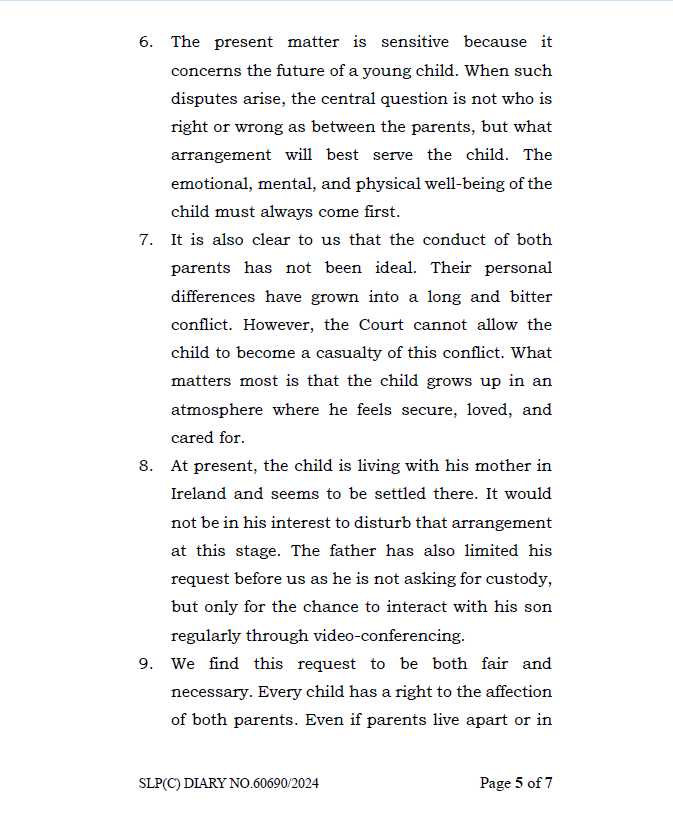SC Upholds Child’s Right to Parental Affection Through Virtual Visitation
- M.R Mishra

- Sep 2, 2025
- 2 min read
In Manoj Dhankar v. Neeharika & Ors. (Civil Appeal No. 11332 of 2025), the Supreme Court of India addressed a sensitive issue of custody and visitation, reiterating that in all such matters the paramount consideration is the welfare of the child.

What's The Matter?
The case originated in a matrimonial dispute where the minor son, born in 2016, has remained in the custody of his mother since 2017.
The father initially pursued custody under the Guardians and Wards Act, 1890, but those proceedings faltered due to his repeated violations of interim directions and the subsequent relocation of the child to Ireland with the mother.
What Court Said?
When the Punjab and Haryana High Court rejected his appeal, largely on the grounds of his earlier non-compliance and the stability of the child’s current environment, the father approached the Supreme Court. \
By then, his claim was no longer for custody but was restricted to visitation rights through video conferencing a request that introduced the question of how Indian courts should secure a child’s continuing bond with a non-custodial parent in cross-border circumstances.

The Supreme Court, speaking through Justices Vikram Nath and Sandeep Mehta, emphasized that custody disputes are not adversarial contests but welfare inquiries, where the competing claims of parents are subordinate to the child’s best interests.
The Court also invoked the principle that a child has an inalienable right to the love and affection of both parents, a principle consistently recognized in past decisions such as Gaurav Nagpal v. Sumedha Nagpal (2009) 1 SCC 42 and Roxann Sharma v. Arun Sharma (2015) 8 SCC 318.
Balancing the mother’s settled care of the child in Ireland with the father’s right to maintain a parental relationship, the Court ordered that the father be permitted two hours of interaction every alternate Sunday via video conferencing. Both parents were directed to cooperate in ensuring compliance.

In doing so, the Court affirmed the increasing judicial reliance on digital platforms as a substitute for physical access, particularly in cases where international relocation renders conventional visitation impractical.
The judgment also underscores that past defaults by a parent, while relevant, cannot permanently eclipse a child’s entitlement to affection from both parents.
Instead, the Court adopted a rehabilitative approach, allowing the father a meaningful though technologically mediated role in the child’s upbringing.
This decision thus reinforces a dual principle: the welfare of the child remains the cornerstone of custody law, and courts are prepared to innovate by embracing virtual contact to ensure that principle is not defeated by geographical or procedural hurdles.
In a globalized world where families increasingly cross borders, this ruling signals the Court’s willingness to adapt traditional doctrines of custody to new realities.
Citation: MANOJ DHANKAR VS. NEEHARIKA - C.A. No. 11332/2025 - Diary Number 60690 / 2024 - 02-Sep-2025 2025 INSC 1068
Disclaimer:
This blog is intended for informational and academic purposes only.
It provides a general analysis of the Supreme Court’s decision based on publicly available records and does not constitute legal advice. Readers are advised to consult a qualified legal professional for guidance on specific cases or issues.







Comments